

Focus and Chill - productivity tactics for AuDHDers and other neurodivergent folks
Jeremy Nagel and Joey K
Welcome to the Focus and Chill podcast where we discuss productivity tactics that work for AuDHDers and other neurospicy people.
Every episode we interview guests with lived experience of neurodivergence who also have a solid productivity and habit game and pass the learnings on to you, our wise and benevolent audience.
Podcast sponsored by https://focusbear.io
Every episode we interview guests with lived experience of neurodivergence who also have a solid productivity and habit game and pass the learnings on to you, our wise and benevolent audience.
Podcast sponsored by https://focusbear.io
Episodes
Mentioned books

Apr 20, 2025 • 45min
Episode 101: Sharon Collon
Welcome to Episode 101! We’re thrilled to be joined by Sharon Collon, ADHD coach, parenting expert, and founder of The Functional Family. Sharon shares her journey of creating practical ADHD strategies for individuals and families by working with—not against—the ADHD brain.JN: Can you tell us about your experience with ADHD?Married into ADHD: fell in love with her husband’s hyperactive ADHD brain.Recognized early signs in her children, leading to family-wide support efforts.Started with therapies, pivoted to whole-family ADHD-focused strategies after burnout.JN: What challenges did you face?Emotional dysregulation across the whole family.Throwing therapies at the problem without seeing real-life results.Overwhelm, financial strain, and lack of holistic support initially.JN: What changes came after studying ADHD formally?Focused on family dynamics, not just child interventions.Created practical, strengths-based strategies tailored to ADHD brains.Shifted toward helping families and adults find what uniquely works for them.JN: What neuroexceptional strengths do you see often?Kindness, love of learning, fairness, and justice are common strengths.Incredible problem-solving abilities and pattern recognition.Ability to disrupt stagnant systems with creativity and new ideas.JC: What projects are you working on now?ADHD Classroom Strategies Course for teachers.Sibling Conflict Programs to foster harmony.A 31-Day Family Connection Challenge.Focus on Rejection Sensitivity Dysphoria education.JN: What are your productivity tips for ADHD brains?Light theme days instead of rigid time-blocking.Opening and closing workday rituals to set a rhythm.Weekly "triage" system to prioritize tasks like an ER nurse.JN: What productivity strategies tend to fail?Heavy structure early on often backfires.Ignoring time-awareness challenges leads to procrastination.Rigid routines without flexibility result in abandonment.JN: How has your morning routine evolved?Focus on removing friction points (example: toothbrush at the breakfast table).Environmental changes to support easy habit formation.Finding micro-moments of joy (like cappuccinos and sea walks).JN: How is your sleep, and how do you switch off?Sleep is a major challenge ("three sleep terrorists" + husband’s snoring).Critical to physically lock away her phone at night.Uses magnesium, low lighting, and consistent sleep signals for winding down.JN: Where can people connect with you?Website: https://www.thefunctionalfamily.com/Facebook: https://www.facebook.com/thefunctionalfamily/Instagram: https://www.instagram.com/thefunctionalfamily/JN: Final Words for the Audience"You don't need to try harder—you need to try differently."Embrace experimentation, celebrate progress, and build strategies that work uniquely for you.More from Focus Bear:Website: https://focusbear.ioLinkedIn: https://www.linkedin.com/company/focus-bear/Youtube: https://www.youtube.com/@focusbearappTwitter: https://twitter.com/focusbear1Instagram: https://www.instagram.com/focus_bear/Facebook: https://www.facebook.com/focusbearapp/Podcast: https://podcast.focusbear.ioTiktok: https://www.tiktok.com/@focusbearConnect with Jeremy:LinkedIn: https://linkedin.com/in/nageljeremyEmail: jeremy@focusbear.ioConnect with Joey:LinkedIn: https://www.linkedin.com/in/joeycorea/Newsletter: https://thepluckyjester.com/newsletter/
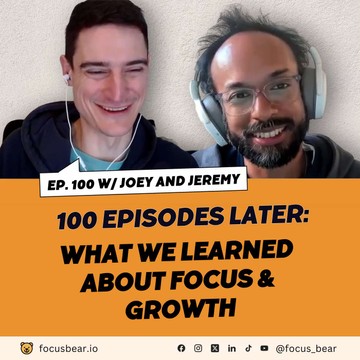
Apr 17, 2025 • 34min
Episode 100: Joey and Jeremy
Welcome to Episode 100!This special milestone episode is a no-guest conversation between your hosts Joey and Jeremy. After 100 episodes, they reflect on lessons learned about productivity, focus, neurodivergence, energy management, and finding joy in everyday work.JN: What has changed in your routines since starting the podcast?Joey: Shifted to working with ultradian rhythms: 90 minutes focus, 30 minutes break.Jeremy: Focused more on energy management, not time management. Uses longer focus blocks instead of strict Pomodoros.JN: How do you apply Pomodoro alongside ultradian rhythms?Joey: Adjusted breaks for eyesight and movement. Micro-stretches every 30 minutes.Jeremy: Uses Focus Bear to cue breaks when natural pauses happen. Breaks spark creativity.JN: How has your work-life balance evolved?Jeremy: More meetings now, harder to find long focus blocks. Misses the "maker schedule" days.Joey: Importance of "keystone habits" like journaling. When they slip, everything else follows.JN: How do you prioritize when things get overwhelming?Jeremy: Weekly accountability call, paper notes, and identifying the three most important tasks daily.Joey: Returns to fundamental routines (morning and evening journaling) to regain clarity.JN: What are your current capture systems?Jeremy: Paper inbox for short-term, medium-term, and long-term tasks.Joey: Hybrid journaling system—handwriting for stream-of-consciousness, typing for daily logs.JN: How do you use journaling for insight?Joey: Tracks convergence and divergence from personal values.Jeremy: Journals help identify "intrinsic motivation" versus "extrinsic obligation."JN: How do you approach "sunk cost fallacy" and project decisions?Jeremy: Reflects on intrinsic joy versus external obligation. Wants to move toward more internally motivated projects.Joey: Discusses reframing tough situations to reclaim agency.JN: How do you inject creativity into boring tasks?Jeremy: Takes the "scenic route" on tasks (e.g., scripting automation instead of manually updating diagrams) to make work more funJN: What role does environment play in focus and creativity?Joey: Walks in nature for creative thinking.Jeremy: Flights and long train rides without WiFi help with deep reading and focus.JN: How do coworking spaces fit into your workflow?Joey: Home is the cave; coworking spaces offer diffuse, social stimulation.Jeremy: Sees coworking as a "cathedral" space for connection.JN: Final reflections after 100 episodes?Grateful for the journey, lessons learned, and excited for the next 100 episodes!Invite listeners to suggest guests or topics.More from Focus Bear:Website: https://focusbear.ioLinkedIn: https://www.linkedin.com/company/focus-bear/Youtube: https://www.youtube.com/@focusbearappTwitter: https://twitter.com/focusbear1Instagram: https://www.instagram.com/focus_bear/Facebook: https://www.facebook.com/focusbearapp/Podcast: https://podcast.focusbear.ioTiktok: https://www.tiktok.com/@focusbearConnect with Jeremy:LinkedIn: https://linkedin.com/in/nageljeremyEmail: jeremy@focusbear.ioConnect with Joey:LinkedIn: https://www.linkedin.com/in/joeycorea/Newsletter: https://thepluckyjester.com/newsletter/
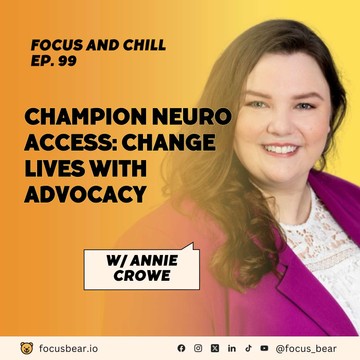
Apr 11, 2025 • 47min
Episode 99: Annie Crowe
Welcome to Episode 99!We’re thrilled to have Annie Crow—an autistic & ADHD human rights lawyer, founder of the Neuro Access Network, and keynote speaker on neurodiversity advocacy—join us today. In this episode, Annie shares her personal journey toward embracing her neurodivergence, the challenges she’s overcome, and how she’s turned that into empowering work for her community.JN: Can you tell us about your experience with neurodiversity?Felt different from an early age (nickname “Princess in the pea”).Highly sensitive to emotional, physical, and sensory stimuli.Developed self-awareness long before formal diagnosis.JN: When did you realise that you weren’t neurotypical?Formally diagnosed at 28 after years of therapy.Noticed unique traits when starting full-time work.Diagnosis confirmed what she had suspected all along.JN: What challenges did you face?Initial misdiagnosis (anxiety, depression, PTSD).Struggled with misunderstanding and stigma.Difficulty reconciling public stereotypes with her extroverted nature.JN: What changes have come post diagnosis?Embraced her autistic and ADHD identity with pride.Shifted focus to self-advocacy and community support.Transitioned from public service to working for herself.JN: What challenges do you still face now?Overcoming societal stigma around autism vs. ADHD.Navigating the “double empathy” problem in professional settings.Balancing complex emotions and perfectionism.JN: What neuroexceptional strengths are you leaning into now?Deep sensitivity and creativity as tools for advocacy.Passion for honest self-expression and challenging norms.Ability to debunk myths about neurodivergence and leadership.JN: What “work” projects are you concentrating on?Leading the Neuro Access Network.Hosting the Princess and the P podcast on neurodiversity.Founding Eating Disorders Neurodiversity Australia.Keynoting on accessibility and burnout in various sectors.JN: How about the rest of the time? What do you enjoy doing in your off time?Enjoys tech (e.g., Notion), coworking, and stream deck gadgetry.Loves spending time with her family and her “standard poodle” Moose.Finds balance through creative outlets and self-care.JN: What do you do to optimise productivity during your working hours?Developing the “pulse framework” to balance hyperfocus and recovery.Prioritizing flexible, energy-driven work routines.Using tech tools to remove friction and streamline tasks.JN: What unhelpful productivity advice doesn’t work for you?Overly rigid pacing or “one-size-fits-all” time-blocking.Standardized routines that ignore her neurodivergent needs.JN: What does your morning routine look like and how has it evolved over time?No strict early-morning ritual; struggles with being a night owl.Uses a relaxed approach with gradual wake-up and flexible start.Adapts daily plans based on energy levels and recovery needs.JN: How is your sleep? How do you switch off at night?Sleep is a constant struggle; tends to have poor sleep hygiene.Uses her Kindle for fiction-only reading to quiet her mind.Continuously refining her bedtime routine to improve rest.JN: Where can people connect with you or find your work?LinkedIn: https://www.linkedin.com/in/anniecrowe/Website: https://www.neuroaccess.com.au/contactFacebook: https://www.facebook.com/AnnieCroweNeuroAccess/Instagram: https://www.instagram.com/_anniecrowe/?hl=enJN: Do you have any final words or asks for our audience?Emphasizes being kind to yourself and embracing your neurodivergence.Encourages joining her network (discount code “Power 2025” available).Advocates for accessible, supportive environments in every aspect of life.More from Focus Bear:Website: https://focusbear.ioLinkedIn: https://www.linkedin.com/company/focus-bear/Youtube: https://www.youtube.com/@focusbearappTwitter: https://twitter.com/focusbear1Instagram: https://www.instagram.com/focus_bear/Facebook: https://www.facebook.com/focusbearapp/Podcast: https://podcast.focusbear.ioTiktok: https://www.tiktok.com/@focusbearConnect with Jeremy:LinkedIn: https://linkedin.com/in/nageljeremyEmail: jeremy@focusbear.ioConnect with Joey:LinkedIn: https://www.linkedin.com/in/joeycorea/Newsletter: https://thepluckyjester.com/newsletter/
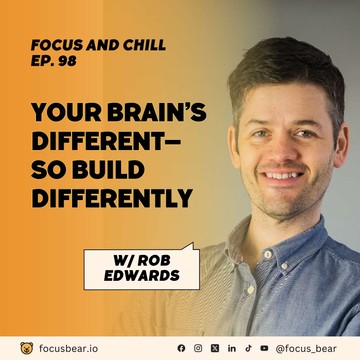
Apr 10, 2025 • 44min
Episode 98: Rob Edwards
Welcome to episode number 98 of the Focus and Chill podcast.We’re thrilled to be joined by Rob Edwards today. Rob is the CEO of the NEA—the Neurodiversity and Entrepreneurship Association. The NEA provides a meeting place for all those with an interest in neurodiversity and entrepreneurship, creating a safe and nurturing environment for neurodivergent entrepreneurs to get the help and support they need to start their own businesses—and the ongoing support to keep them running and earning an income.Based in West Yorkshire in the UK, Rob is a neurodivergent entrepreneur himself and has worked with membership groups, academics, and businesses for over 20 years, holding senior roles in academic publishing. Before becoming self-employed in 2014, he advised on marketing, events, business development, and board strategy, and has also been an associate lecturer in creativity and innovation.Great to have you on the show, Rob.JN: When did you realise that you weren’t neurotypical?Around 4–5 years ago during conversations with other neurodivergent entrepreneurs.Lightbulb moment: “What they’re describing is exactly what I go through.”Inspired by his son’s autism diagnosis and family’s subsequent diagnoses (ADHD, autism).JN: What challenges did you face?Overwhelm, inability to finish projects, self-doubt.Mistook executive dysfunction for laziness.Compared himself negatively to neurotypical colleagues.JN: What changes have come post diagnosis?Reframed self-talk and practiced more self-compassion.Realized traditional productivity methods didn’t work.Started designing systems around his brain, not against it.JN: What challenges do you still face now?Hyperfocus burnout.Imposter syndrome, rejection sensitivity.Energy crashes after intense creative focus.Still learning to accept what works best for him.JN: What neuroexceptional strengths are you leaning into now?Hyperfocus enables rapid execution.High creativity and pattern recognition.Can see connections others might miss.Embracing divergent thinking and innovation.JN: What “work” projects are you concentrating on?Running NEA: supporting neurodivergent entrepreneurs.Partnering with universities on inclusive business programs.Launching a new freelance-focused careers hub.Working on PhD in neurodivergent entrepreneurship.JN: What do you enjoy doing in your off time?Caring for his autistic son, who is homeschooled.Amateur dramatics: musicals, theater, and performance.Finds focus and joy through rehearsal and creative expression.JN: What do you do to optimise productivity during working hours?Uses a reMarkable tablet for distraction-free planning.Leverages Motion to auto-schedule tasks.Plans around energy peaks (10AM–6PM works best).Balances chaos with loose structure—"organized mess."JN: What is some unhelpful productivity advice that doesn’t work for you?Time-blocking and Pomodoro techniques.Can't “force” hyperfocus to happen on demand.Prefers tools that adjust to natural flow and rhythm.JN: What does your morning routine look like and how has it evolved over time?Starts around 9:30–10AM (no longer guilty about late starts).Family time and coffee before work.Reflects on priorities and adjusts day accordingly.Embraces energy-driven, flexible mornings.JN: How is your sleep? How do you switch off at night?Struggles with winding down.Uses phone scrolling to calm his brain.Gets decent rest but wakes up tired—still a work in progress.Enjoys quiet evenings with family and box sets.JN: Where can people connect with you or find your work?LinkedIn: https://www.linkedin.com/in/robtedwards/Website: https://www.nea.global/JN: Final words or asks for the audience?"Diverse minds, limitless possibilities" — NEA’s motto.Encourages community and collaboration.Believes the tide is rising for neurodivergent inclusion.“Keep pushing forward — together we’re stronger.”More from Focus Bear:Website: https://focusbear.ioLinkedIn: https://www.linkedin.com/company/focus-bear/Youtube: https://www.youtube.com/@focusbearappTwitter: https://twitter.com/focusbear1Instagram: https://www.instagram.com/focus_bear/Facebook: https://www.facebook.com/focusbearapp/Podcast: https://podcast.focusbear.ioTiktok: https://www.tiktok.com/@focusbearConnect with Jeremy:LinkedIn: https://linkedin.com/in/nageljeremyEmail: jeremy@focusbear.ioConnect with Joey:LinkedIn: https://www.linkedin.com/in/joeycorea/Newsletter: https://thepluckyjester.com/newsletter/
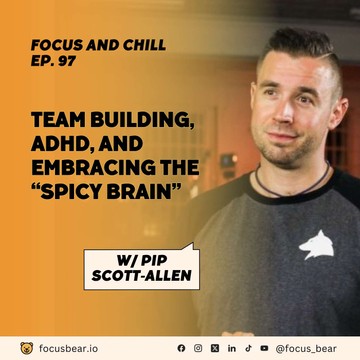
Apr 6, 2025 • 44min
Ep. 97 Pip Scott-Allen
Welcome to episode 97 of the Focus and Chill podcast! Today’s guest is the energetic and insightful Pip Scott‑Allen, originally from Canada and now making waves in Australia.Pip’s journey into leadership and team culture began early—at just 14, he started exploring the world of team building. Since then, he’s worn many hats: outdoor educator, backcountry guide, adventure leader, camp director, lifeguard, and tourism professional. These experiences laid the foundation for his current passion: helping teams thrive.After being diagnosed with ADD in college, Pip began leaning into his neurodivergent strengths—creativity, adaptability, and a deep empathy for others. Six years ago, he founded Premier Team Building, a company dedicated to helping businesses across Australia strengthen their leadership and culture through dynamic, people-first strategies.Pip brings humor, purpose, and a bit of “spicy brain” energy to everything he does—and we’re excited to dive into his story.Welcome to the show, Pip!JN: Can you tell us about your experience with neurodiversity?Always felt “a bit spicy.”High energy and creative as a kid.Loved sports, theatre, and music.Often felt different but didn’t know why.JN: When did you realise that you weren’t neurotypical?College roommate noticed differences.Got tested and diagnosed with DD.Diagnosis brought clarity and relief.JN: What challenges did you face?Executive functioning issues.Trouble with focus and organization.Emotional exhaustion from masking.Lack of support in early years.JN: What changes have come post diagnosis?Learned to work with his brain, not against it.Uses a “Kill List” to prioritize tasks.Builds flexible systems and routines.Embraced delegation and self-awareness.JN: What challenges do you still face now?Executive dysfunction still present.Rigidity in planning causes stress.Sensory overload in busy environments.Energy crashes after intense work.JN: What neuroexceptional strengths are you leaning into now?Hyperfocus and creative thinking.Natural leader in team environments.Strong empathy and people skills.Innovative event and culture design.JN: What “work” projects are you concentrating on?Running Premier Team Building.Organizing large-scale team events.Coaching business leaders on inclusive cultures.Supporting neurodivergent individuals in the workplace.JN: How about the rest of the time? What do you enjoy doing in your off time?Hiking and camping.Quality time with wife and dogs.Enjoys horror movies and live music.Wine tasting and being outdoors.JN: What do you do to optimise productivity during your working hours?Uses a “Kill List” with max 5 tasks.Blocks time in calendar.Takes intentional breaks.Uses fidgets and noise-cancelling headphones.JN: What is some unhelpful productivity advice that doesn’t work for you?Rigid, all-day planning doesn’t work.“One task all day” approach backfires.Needs flexibility to manage mental energy.JN: What does your morning routine look like and how has it evolved over time?Wakes up around 4:00 AM.Prepares night before to reduce decision fatigue.Takes vitamins, gym, and reviews task list.Gets going early with minimal friction.JN: How is your sleep? How do you switch off at night?Aims for 9–10 PM bedtime.Often only gets 4–5 hours.Falls asleep quickly due to exhaustion.Working on improving sleep hygiene.JN: Where can people connect with you or find your work?LinkedIn: https://www.linkedin.com/in/pip-scott-allen-facilitator-of-awesome-8458a069/Email: pip@premierteambuilding.com.auWebsite: https://premierteambuilding.com.au/Facebook: https://www.facebook.com/PremierTeamBuildingAus/Instagram: https://www.instagram.com/premier_team_building/JN: Do you have any final words or asks for our audience?Be kind to yourself.Understand and respect your energy limits.Use tools like the “spoon theory.”Build a life that works for your brain.More from Focus Bear:Website: https://focusbear.ioLinkedIn: https://www.linkedin.com/company/focus-bear/Youtube: https://www.youtube.com/@focusbearappTwitter: https://twitter.com/focusbear1Instagram: https://www.instagram.com/focus_bear/Facebook: https://www.facebook.com/focusbearapp/Podcast: https://podcast.focusbear.ioTiktok: https://www.tiktok.com/@focusbearConnect with Jeremy:LinkedIn: https://linkedin.com/in/nageljeremyEmail: jeremy@focusbear.ioConnect with Joey:LinkedIn: https://www.linkedin.com/in/joeycorea/Newsletter: https://thepluckyjester.com/newsletter/
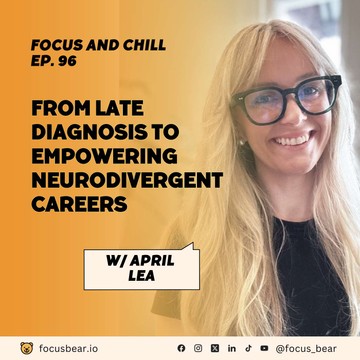
13 snips
Apr 5, 2025 • 45min
Episode 96: April Lea
April Lea, an ADHD founder with a background in product management and software engineering, shares her powerful journey after a late diagnosis. She discusses the challenges of masking her neurodivergence and the burnout that led to the creation of the Neurodiversity Network. The conversation delves into coping strategies for sensory overload, the balance between personal and professional life, and effective daily routines for better productivity. April emphasizes the importance of self-acceptance and community support for neurodivergent individuals.
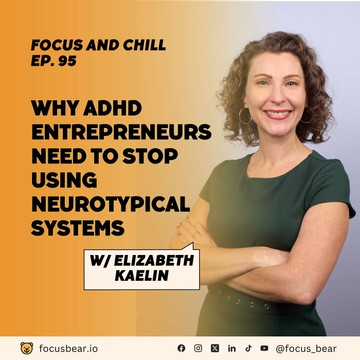
Apr 2, 2025 • 38min
Episode 95: Elizabeth Kaelin
Elizabeth Kaelin, a tech founder and commercialization mentor, shares her inspiring journey of navigating ADHD later in life. She discusses overcoming burnout and adapting her leadership style to embrace neurodiversity as a strength. Elizabeth highlights energy-based productivity, the importance of optimizing strengths over fixing weaknesses, and the need for inclusive workplaces. The conversation dives into personal insights on managing productivity, evolving routines, and using tools like aromatherapy to enhance focus while fostering a healthy work-life balance.
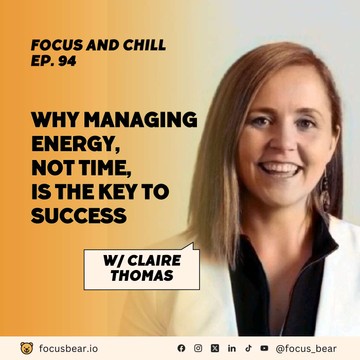
Feb 22, 2025 • 39min
Episode 94: Claire Thomas
Welcome to episode #94! We’re thrilled to be joined by Claire Thomas today.Claire Thomas is the CEO and founder of Impact Group, a fast-scaling consulting firm that went from a solo startup to a 50-person, $12 million company in just two years. A 2024 Australian Women’s Small Business Champion and finalist for CEO of the Year, Claire brings deep expertise in business transformation, leadership, and public sector consulting.Diagnosed with ADHD in her late 30s, Claire’s leadership now prioritizes energy management, neurodivergent-friendly workplaces, and gamified productivity strategies. With over 45% of her team identifying as neurodivergent, she is redefining what it means to build an inclusive, thriving business.In this episode, we explore how ADHD fuels innovation, why energy management matters more than time, and how neurodivergent leadership is shaping the future of work.Welcome to the show, Claire!QuestionsJN: What led to your ADHD diagnosis in your late 30s?Realized she ticked more ADHD boxes than her child during their assessmentGrew up with the stereotypical image of ADHD as hyperactive boysDiagnosis changed how she viewed her past struggles with anxiety & executive functionJN: How did ADHD impact your early career?Struggled with traditional work structures & long-term planningExcelled in high-stimulation environments with constant problem-solvingAlways sought fast-moving, complex challenges that kept her engagedJC: What strengths do you lean into as a neurodivergent CEO?Pattern recognition & intuitive problem-solvingRapid decision-making & adaptability in uncertain marketsAbility to connect A to D without needing B & C in betweenJN: What is your "energy credits" system, and how does it help?Created a daily energy credit system (max 100 credits) to prevent burnoutActivities like sleep, movement & hydration "add credits"Overuse of focus or stress "spends credits" and requires recoveryJC: How do you balance high performance with sustainable work habits?Encourages her team to manage energy instead of just pushing productivityUses gamification strategies to make work more engagingHelps employees avoid burnout by tracking “energy debt” over multiple daysJN: What challenges do you still face as a neurodivergent leader?Managing macro time (long-term planning) is still difficultEnsuring that fast-paced decisions don’t leave her team behindBalancing innovation with structured executionJN: What role does AI & automation play in your workflow?Uses AI-generated "ClaireBot" to draft applications & communicationsAutomates decision-making processes to reduce cognitive loadLeverages AI for business insights & streamlining client solutionsJC: What productivity strategies work for you?Uses Jira as a personal Kanban board to track ideas & tasksPrefers momentum-building tasks before tackling hard projectsSchedules clearance blocks for deep focus & reducing backlogJC: What productivity strategies DON’T work for you?“Eat the frog” method (doing the hardest task first)—kills motivationStrict time-blocking—prefers adaptive schedules based on energy levelsForcing linear thinking—thrives on intuitive problem-solving & connectionsJN: What does your morning routine look like?Starts the day by guiding her neurodivergent children through their morning routinesRuns with a work colleague for accountability (3-4 days a week)Externalizes plans visually to offset ADHD-related time blindnessJN: How do you wind down at night?Drinks herbal tea & avoids social media before bedPrioritizes consistency over perfection—acknowledges that routines aren’t always easyManages "galaxy brain" thoughts by externalizing ideas before sleepJN: Where can people connect with you?LinkedIn: https://www.linkedin.com/in/claire-m-thomas/JC: Final words for the audience?“Manage energy, not time. You can’t borrow from tomorrow forever.”“Success isn’t about doing everything—it’s about doing what works for you.”More from Focus Bear:Website: https://focusbear.ioLinkedIn: https://www.linkedin.com/company/focus-bear/Youtube: https://www.youtube.com/@focusbearappTwitter: https://twitter.com/focusbear1Instagram: https://www.instagram.com/focus_bear/Facebook: https://www.facebook.com/focusbearapp/Podcast: https://podcast.focusbear.ioTiktok: https://www.tiktok.com/@focusbearConnect with Jeremy:LinkedIn: https://linkedin.com/in/nageljeremyEmail: jeremy@focusbear.ioConnect with Joey:LinkedIn: https://www.linkedin.com/in/joeycorea/Newsletter: https://thepluckyjester.com/newsletter/
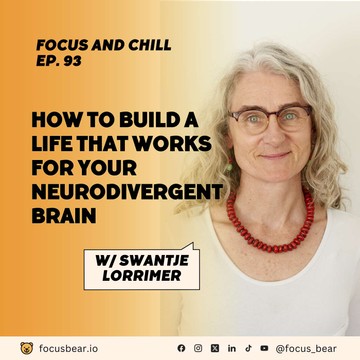
Feb 22, 2025 • 42min
Episode 93: Swantje Lorrimer
Welcome to episode #93! We’re thrilled to be joined by Swantje Lorrimer today.Swantje Lorrimer has built a career spanning multiple industries, including academic research, film productions (Star Wars, The Fall Guy), and ADHD coaching. After struggling to fit into traditional job structures, she embraced freelancing, creativity, and adventure as the key to thriving with ADHD.In this episode, we explore dopamine-seeking behavior, unconventional careers, ADHD-friendly productivity strategies, and why neurodivergent people often struggle with traditional routines.Welcome to the show, Swantje!QuestionsJN: When did you first realize you were neurodivergent?Realized later in life after seeking ADHD coaching for her childrenInitially dismissed the ADHD coach’s comments—until she recognized her own patternsDiagnosis made everything in her life make senseJN: What was it like growing up undiagnosed with ADHD?Left home at 16 to move to Finland with no prior knowledge of FinnishSought big, high-stimulation experiences—milking goats in a hippie commune, working in hospitals, etc.Always chased dopamine hits—leading to an adventurous but unpredictable careerJC: What was your career path before becoming an ADHD coach?Worked as a costume designer on major film productions like Star WarsFreelanced in theater, opera, and academic research in philosophyStruggled with structured, repetitive jobs, always seeking new challengesJN: How did getting diagnosed with ADHD change things for you?Stopped feeling like a failure—realized her brain just worked differentlyUnderstood that she needed flexibility, novelty, and control over her workLearned to embrace her ADHD instead of fighting against itJC: What led you to ADHD coaching?Saw her own children struggle with neurodivergence and wanted to support othersRealized her background in academia and creativity gave her a unique coaching perspectiveStudied ADHD coaching in New York and now runs Doing, Doing, DoneJN: What productivity strategies work for you?Avoids SMART goals—prefers a fluid, adaptable approach to projectsUses dopamine as a guide—choosing tasks that naturally engage her brainOutsources and delegates when possible instead of trying to do everything aloneJC: What productivity strategies DON’T work for you?Strict routines & time-blocking—every day is different, so flexibility is keyRigid linear task completion—she works best by jumping between ideasOvercommitting to projects without energy management—learned to say no strategicallyJN: What does your morning routine look like?No fixed routine—every day is differentLoves starting the day with deep focus work when possibleGoes to the gym when energy allows, without rigid expectationsJN: How do you wind down at night?Drinks hot cocoa and reads a book before bedEngages in creative activities like bookbinding and illustrationPrioritizes listening to her energy levels rather than forcing structureJN: Where can people connect with you?Website: https://www.doingdoingdone.com.au/LinkedIn: https://www.linkedin.com/in/swantje-lorrimer-14172558/Facebook: https://www.facebook.com/profile.php?id=61567285666137JC: Final words for the audience?“Your brain isn’t broken—stop trying to make it fit neurotypical standards.”“The world needs neurodivergent thinkers—find your own way to thrive.”More from Focus Bear:Website: https://focusbear.ioLinkedIn: https://www.linkedin.com/company/focus-bear/Youtube: https://www.youtube.com/@focusbearappTwitter: https://twitter.com/focusbear1Instagram: https://www.instagram.com/focus_bear/Facebook: https://www.facebook.com/focusbearapp/Podcast: https://podcast.focusbear.ioTiktok: https://www.tiktok.com/@focusbearConnect with Jeremy:LinkedIn: https://linkedin.com/in/nageljeremyEmail: jeremy@focusbear.ioConnect with Joey:LinkedIn: https://www.linkedin.com/in/joeycorea/Newsletter: https://thepluckyjester.com/newsletter/
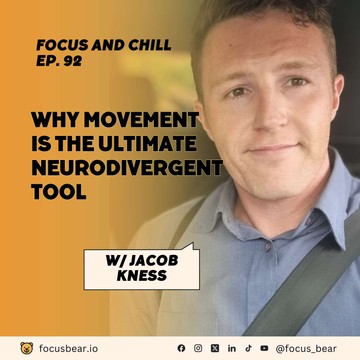
Feb 22, 2025 • 51min
Episode 92: Jacob Kness
Welcome to episode #92! We’re thrilled to be joined by Jacob Kness today.Jacob Kness is a social entrepreneur and neurodivergent advocate, helping autistic job seekers find meaningful work. Diagnosed with autism, ADHD, and Tourette’s, Jacob has spent years exploring fitness, biomechanics, and biohacking as tools for mental and physical well-being.In this episode, we dive into how exercise, cold shock therapy, and breathwork can help neurodivergent individuals build resilience, focus, and confidence.Welcome back to the show, Jacob!QuestionsJN: How has your approach to fitness evolved over time?Started with bodybuilding-style training, then shifted to functional movementExplored martial arts, breath control & biomechanics to improve movement patternsUses fitness as a daily practice for managing Tourette’s & ADHD symptomsJN: What role does exercise play in managing neurodivergent traits?Helps with mind-body connection & proprioceptionStrengthens fast-twitch muscle fibers for better motor controlActs as a tool for emotional regulation & energy managementJC: How did cold shock therapy become part of your routine?Discovered its benefits through Wim Hof breathing & resilience trainingHelps with stress regulation, focus & nervous system balanceUses cold showers & ice baths to reset after workoutsJN: What biomechanical challenges do neurodivergent individuals often face?Poor posture & joint alignment due to sensory processing differencesFoot placement, hip alignment & movement efficiency can impact trainingMany personal trainers overlook neurodivergence in exercise programmingJC: What advice would you give neurodivergent individuals starting their fitness journey?Listen to your body rather than following rigid workout plansFind movement styles that feel natural—martial arts, yoga, weightlifting, etc.Focus on form, breath, and body awareness before increasing intensityJN: How does fitness improve social confidence & resilience?Gyms provide structured social exposure without forced interactionBuilds discipline, self-trust & confidence in everyday lifeMartial arts, team sports & group training offer supportive communitiesJC: What productivity strategies work best for you?Uses exercise as an anchor to set the tone for the dayBreaks tasks into physical & mental blocks to maintain focusUses breathwork & cold exposure for quick resets during high-energy tasksJN: What does your morning routine look like?Starts with movement (stretching, light training, or breathwork)Uses cold exposure as a mental reset before workEats high-protein meals to fuel brain functionJN: How do you wind down at night?Rolls out muscles & stretches to relax the nervous systemAvoids high-stimulation activities before bedJournals & reflects on the day's progressJN: Where can people connect with you?LinkedIn: https://www.linkedin.com/in/jacob-alan-kness/Email: jacob.alan.business@gmail.comAsperger’s Victoria Website: https://aspergersvic.org.au/employmentDoughnuts Business: Visit at Acuna Park MarketJC: Final words for the audience?“Find what movement works for you—fitness isn’t one-size-fits-all.”“The body and mind are deeply connected—train both to thrive.”More from Focus Bear:Website: https://focusbear.ioLinkedIn: https://www.linkedin.com/company/focus-bear/Youtube: https://www.youtube.com/@focusbearappTwitter: https://twitter.com/focusbear1Instagram: https://www.instagram.com/focus_bear/Facebook: https://www.facebook.com/focusbearapp/Podcast: https://podcast.focusbear.ioTiktok: https://www.tiktok.com/@focusbearConnect with Jeremy:LinkedIn: https://linkedin.com/in/nageljeremyEmail: jeremy@focusbear.ioConnect with Joey:LinkedIn: https://www.linkedin.com/in/joeycorea/Newsletter: https://thepluckyjester.com/newsletter/


